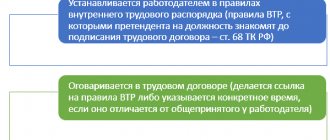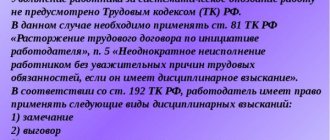For work at night, on weekends and holidays - separate payment
The amendments made it clear that if night work coincides with a holiday or weekend, the additional payment must be separate for night hours, as well as for work on holidays or weekends.
For example, an employee started shift on the night of April 30 from 20.00 to 08.00 on May 1. Night time is considered to be the period from 22.00 to 06.00. By law, the employer must pay for work time as follows:
- From 20.00 to 22.00 - payment at a single rate.
- From 22.00 to 06.00 – add 0.5 rate for night work.
- From 00.00 to 08.00 - add another 0.5 rate for work on a holiday, since May 1 has actually arrived - the red day of the calendar.
“Previously, accountants believed that if a person works at night, and this day coincides with a holiday, then no additional payment is needed. They asked: “Where is the article in the law that talks about a separate additional payment?” Now this innovation clearly explains how the payment is made,” explains Natalya Gileva, associate professor of the department of international law at Al-Farabi KazNU, expert on labor law.
Disabled people can work more than seven hours a day
Although the law still has a restriction on a 36-hour working week for disabled people, the clause according to which disabled people of groups I and II can work no more than seven hours a day has now been removed. According to lawyers, sometimes seven hours was not enough to work. In fact, the employee remained, but was not paid extra, because otherwise the employer would have violated the law.
Now the seven-hour limit has been removed. The main thing is that the employee undergoes an examination by an occupational pathologist. The specialist will indicate in conclusion whether he can work. Thus, there are more guarantees that a person with a disability will not be left without work.
Conscripts will retain their jobs
A clarification was made to the Labor Code that conscripts for compulsory military service retain their jobs. If there is a summons from the military registration and enlistment office, conscripts will retain both their work and salary during the medical examination. And during the period of compulsory military service or military training, work is retained. There is no provision for salary retention during this period.
Within a month after demobilization, those who served must return to their work duties.
Comparison of Labor Code and Labor Code standards
All eight points of Article 33 of the Labor Code are reflected in the Labor Code with specifications and additions. Gathering supporting information often takes management away from running the business. If the employee does not appear in adequate condition, then in case of refusal to be examined by a narcologist, the employer is obliged to take the employee to the clinic at his own expense or invite a specialist from a medical institution to the organization.
Disqualification must be confirmed by an assessment by a special commission. Prior to the verdict, certification establishes rules that presuppose the universal nature of testing of a certain category. It is mandatory to maintain frequency after the expiration of the established period applied to the previous certification and carried out by a special commission for all employees of this profession. Examining a specific employee on an individual basis will give an advantage in court when proving discrimination.
When downsizing, it is problematic to prove that a young developing specialist is more qualified than an employee with “centuries of experience” rooted in the socialist past. In addition, the pension reform that came into force at the beginning of this year 2021 designated a new category - pre-retirees, giving them a privileged position.
The transfer of each Labor Code norm to the current document is presented in the table:
| Norms of Article 33 of the Labor Code | Interpretation of the Labor Code of the Russian Federation | ||
| Item No. | Formulation | Item and Article No. | Additions and comments |
| 1 | Liquidation of an enterprise or branch and representative office in another territorial region, reduction of personnel | Clause 1 Article 81, Clause 2 Article 81 | Divided into 2 separate points. When reducing numbers, it is important to take into account the provisions of Article 179, which gives priority to persons with a higher level of skill and qualifications |
| 2 | Job inconsistency identified as a result of insufficient special qualifications or due to physical health conditions | Clause 3 Article 81, Clause 8 Article 77 | Low qualifications must be confirmed by an attestation commission, and health status must be confirmed by a conclusion from a specialized medical institution |
| 3 | Systematic failure to fulfill duties in the presence of a reprimand or reprimand | Clause 5 Article 81 | Repeated violation when the disciplinary sanction has not been lifted is grounds for termination of the relationship |
| 4 | Absenteeism (absence from work for more than 3 hours during the day) | Part 1, Clause 6, Article 81 | Four consecutive hours (outside the workplace) or a full shift, regardless of duration |
| 5 | Absence from attendance for more than 4 months in a row due to an illness not related to professional activity | Clause 5 Article 83, Clause 8 Article 77 | If complete incapacity for work is not immediately established by a medical report, then before dismissal the employer is obliged to retain the job for 4 months |
| 6 | Reinstatement of a former employee who previously occupied the position | Clause 2 Article 83 | Grounds: decision of the state labor inspectorate or court |
| 7 | Appearing on the territory of the enterprise in a state of any kind of intoxication | Part 2, Clause 6, Article 81 | Mandatory confirmation by a licensed medical institution |
| 8 | Committing theft of state or public property at work | Part 4, Clause 6, Article 81 | Establishment by a court verdict or a resolution of the relevant body |
Warning! The Labor Code of the Russian Federation in its original version, in force since 2002, made it possible to independently ascertain the fact of deterioration in performance due to health reasons. Law No. 90-FZ of June 30, 2006 established a ban by excluding the allowing subclause from Article 81 of the Labor Code.
Dismissal by personal notice
If an employment contract is terminated due to the employee’s absence from work for more than one month for reasons unknown to the employer, the employee must be given a copy of the dismissal order. Now an important postscript has appeared “with notification of its delivery . In other words, it is not enough to deliver the envelope, it is important to hand it over personally. Notification cannot be sent via instant messengers or email.
An addition has been made to the grounds for dismissal at the initiative of the employer. Now you can dismiss an employee if he used his official position in his own interests or in the interests of a third party contrary to the interests of the employer in exchange for obtaining material or other benefits for himself or other persons.
“For example, during the quarantine, couriers delivered groceries, and customers were told that the order had become more expensive, although in fact this was not true. Is there any damage to your reputation? Certainly. This case falls under the scope of the article, as do those who work in the field of public procurement and make sure that a specific company wins. I have met employment contracts where the amount of compensation was 1000 tenge, 1 MCI, 10 thousand tenge, and so on. This is a slap at employees when concluding an employment contract. The courts are overwhelmed with cases related to this paragraph of the article,” regrets Natalya Gileva.
The authors of the amendments proposed introducing a fixed amount - from 3 to 6 salaries, but employers did not agree to this.
Law of the Republic of Kazakhstan dated May 4, 2021 No. 321-VI introduced many amendments to the current Labor Code of the Republic of Kazakhstan. The AgroInfo news agency correspondent will introduce you to the most basic of them, and those necessary for the employer.
Illustrative collage: AgroInfo / Photos from open sources
The very first change - Article 33 was supplemented by the possibility of concluding an employment contract between an employer and an employee in the form of an electronic document certified by means of an electronic digital signature. Domestic authorities began to announce an information system for recording employment contracts at the end of 2021. An electronic system of employment contracts is already in operation, and some organizations are using it. It allows you to conclude employment contracts, make changes and additions to them, records length of service, penalties for employees and other issues.
Article 45 of the Labor Code of the Republic of Kazakhstan (hereinafter referred to as the Labor Code of the Republic of Kazakhstan) on the transfer of an employee to another workplace has been supplemented with the preservation of the amount and conditions of remuneration. If an employer transfers an employee to another workplace or to another structural unit in the same area, or assigns work on another mechanism or unit within the specialty, then he is obliged to maintain the amount of the previous salary.
An addition has been made to Article 48 of the Labor Code of the Republic of Kazakhstan to the conditions for the removal of an employee. The employer is obliged to remove an employee from work if his actions or inaction have caused or could have caused serious consequences for his life and health, including other employees.
From Article 50 of the Labor Code of the Republic of Kazakhstan, which regulates the procedure for terminating an employment contract by agreement of the parties, clause 3 was excluded , which stated that an agreement with an employee in an employment contract may provide for the right of the employer to terminate the employment contract with a compensation payment, the amount of which is determined by the employment contract.
The case is specified in which an employer has the right to terminate a contract with an employee on his own initiative. Namely, when committing guilty actions or inaction of an employee servicing monetary or commodity assets, as well as using his official position in his own interests or in the interests of a third party contrary to the interests of the employer, in exchange for receiving material or other benefits for himself or other persons, the employer has the right to terminate the contract for own initiative in accordance with Article 52 of the Labor Code of the Republic of Kazakhstan. Termination of the employment contract in this case must be confirmed by an internal investigation report indicating in it the justifications confirming the commission of guilty actions or inaction by the employee. The procedure for internal investigation is established by an act of the employer.
According to paragraph 4 of Article 65 of the Labor Code of the Republic of Kazakhstan, now an employer’s act on imposing a disciplinary sanction on an employee cannot be issued during the investigation of an accident related to work activity in relation to persons who violated labor safety and health requirements. Previously, this subparagraph was not in paragraph 4 of Article 65 of the Labor Code of the Republic of Kazakhstan.
In accordance with paragraph 3 of Article 70 of the Labor Code of the Republic of Kazakhstan, the employer is obliged to establish a part-time working schedule for an employee caring for a sick family member in accordance with a medical report. Previously, part-time working hours were established only for pregnant women and parents with a child under 3 years of age.
Article 110 of the Labor Code of the Republic of Kazakhstan has been supplemented with a payment condition when night work coincides with holidays and weekends. In this case, remuneration is made separately for night hours in accordance with part one of this article and for hours on holidays or weekends in accordance with Article 109 of the Labor Code of the Republic of Kazakhstan .
If the employer fails to pay wages in full and within the time limits established by labor and collective agreements, the employer pays the employee the arrears and a penalty for the period of delay in payment. The amount of the penalty is calculated based on 1.25 times the official refinancing rate of the National Bank of the Republic of Kazakhstan on the day of fulfillment of obligations to pay wages and is accrued for each overdue calendar day, starting from the next day when payments are due and ending on the day of payment. Previously, paragraph 3 of Article 113 of the Labor Code of the Republic of Kazakhstan established a one-time refinancing rate for calculating penalties for late payment of wages;
In addition, paragraph 4 of Article 113 of the Labor Code of the Republic of Kazakhstan is supplemented with a provision for the payment of penalties for late payment of wages upon termination of an employment contract . The amount of the penalty is calculated based on 1.25 times the official refinancing rate of the National Bank of the Republic of Kazakhstan on the day of fulfillment of obligations. A penalty is accrued for each overdue calendar day; the deadline for payment of all amounts due to the employee upon termination of the contract is three working days after termination.
Previously, persons who have served compulsory military service, within two months after completing it, have a preferential right to employment in the organization where they worked before being called up for compulsory military service. Now the place of work for conscripts must be retained for the entire period of military service; paragraph 3 of Article 124 is stated as follows:
For employees subject to conscription for compulsory military service or military training, during the period of passing a medical commission, their place of work (position), salary at the place of work is retained in the presence of a summons to the local military authorities , and for the period of compulsory military service or military fees, the place of work (position) is retained.
An employee who retained a place of work (position) for the period of compulsory military service or military training must begin his work duties no later than one month from the date of exclusion from the lists of the military unit due to dismissal from military service or the end of military training.
Article 182 of the Labor Code of the Republic of Kazakhstan supplements the employer’s obligation in the field of occupational safety and health, namely: to implement a labor protection management system and monitor its functioning.
Gani Ermek
Share material
Pay for pregnant women during temporary transfer
Article 44 of the Labor Code
improves the situation of pregnant women. As before, a pregnant woman can provide a medical certificate stating that work is contraindicated for her if there are harmful and (or) dangerous production factors. In this case, the employer is obliged to transfer her to another, non-contraindicated job. An addition was made that remuneration should be in accordance with the salary for the work performed, but not lower than the average salary for the previous job.
That is, if the new job pays more, then the pregnant woman needs to be paid the higher salary.
If a pregnant woman refuses the job offer, the employer issues an exemption from work without pay until maternity leave. In this case, you cannot be fired.
After 12 weeks of pregnancy, a woman cannot work on a rotational basis.
.
Termination of the contract by agreement of the parties
Photo from the site “All about etiquette”
Termination of the contract by agreement of the parties
As before, a party to an employment contract that has expressed a desire to terminate the employment contract by agreement of the parties sends a notice to the other party to the employment contract (Article 50 of the Labor Code of the Republic of Kazakhstan 2016).
The party that received the notification is obliged to inform the other party in writing of the decision made within 3 business days. If the party who received the notification gives a negative answer, the employment contract continues to operate as usual. If the party receiving the notice gives a positive response, the company proceeds to formalize the dismissal of the employee. The date of termination of the employment contract in this case is determined by agreement between the employee and the employer.
An interesting innovation here, perhaps, is clause 3, which deals with the possible payment of compensation if it is provided for in the employment contract. According to the Labor Code of the Republic of Kazakhstan 2021, there is no requirement for a compensation payment in the amount of at least the average salary for the year (as was the case before). But in the employment contract you can provide for any size.
Remote employees must be provided with everything necessary for work
Article 138 of the Labor Code is devoted to remote work. The employer is obliged to provide the remote employee with everything necessary, including means of communication. If an employee uses, for example, his own Internet or electricity, compensation should be paid.
You can record your working hours at home using IT technologies. Special programs, for example, show whether there is movement on the keyboard. It is more difficult to assess accidents that occurred during working hours.
“I’ll give you one case. The girl worked remotely from home. During working hours, she went to hang laundry on the balcony, tripped and broke her leg. She called an ambulance, went on sick leave and demanded full payment for sick leave. The employer is at a loss: what to do if, in fact, at this time she should not have been dealing with personal affairs, but working?” – Natalya Gileva gives an example.
The article is supplemented by a clause that obliges the employer to develop instructions that will determine the procedure for compliance by such employees with safety and labor protection requirements and to ensure the safe performance of work duties.
List of reasons for dismissal under Article 81 of the Labor Code of the Russian Federation
Reasons for dismissal under Article 81 of the Labor Code of the Russian Federation
Article 81 of the Labor Code of the Russian Federation has a list of reasons that will lead to dismissal. This includes:
- The organization has been liquidated and the employee may be fired. It is also possible to reduce the number of employees.
- The case where the transfer of property to another person occurs is also considered. In such a situation, the management team and the chief accountant may change and fire the employee.
- If an employee does not have sufficient qualifications, this can be identified through certification at the production site or enterprise. The procedure will show how qualified the worker’s work is for the position held.
- The employee's obligations under the contract were repeatedly not observed, and cases were recorded when disciplinary measures were taken against the employee.
- For an employee to be fired, it will be enough if the employee is “caught” for one major violation (for example, theft).
- The reason may be absence from the workplace for more than four hours or during the entire work shift without a valid reason.
- If an employee appears at work once or regularly in an inappropriate state (for example, intoxicated) and there are witnesses to this incident, then dismissal under the article is possible.
- Committing petty theft (personal belongings of other employees or office supplies), damaging the property of other employees or the organization. This includes theft on a particularly large scale.
Article 81 lists many points, the full list is available freely on the Internet or on various legislative portals.
Employers will be protected by associations, workers by trade unions and elected specialists
The Labor Code has a new article 20-1 “Associations (associations, unions) of employers and their powers. Now not only workers can unite in trade unions, but also employers can create and join associations. Unions will represent the rights and interests of employers, including participation in the consideration of various labor disputes.
A labor dispute can also occur with ex-employees. According to the amendments, now a labor dispute is a disagreement between two parties, including those who previously had an employment relationship .
Trade unions can represent the interests of the employee, and where they do not exist, elected representatives elected by a majority vote. In this case, at least 2/3 of the employees must be present at the meeting.
If the organization has a trade union, then negotiations on concluding a collective agreement between the employer and employee without the participation of the trade union are not allowed.









